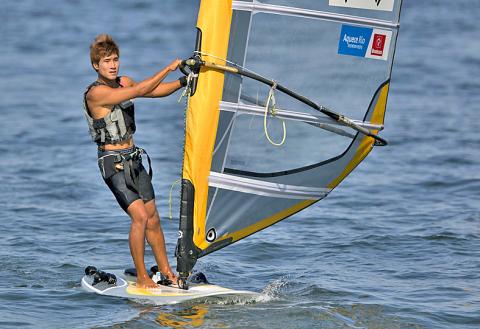South Korean windsurfer Cho Won-woo got his first ride in an ambulance the other day, taken to a Rio de Janeiro hospital with dehydration, vomiting, a headache and dizziness.
Cho is one of four athletes to have “officially” fallen ill so far at the week’s Olympic sailing test event in the city’s polluted Guanabara Bay. Officials acknowledge the reporting is incomplete with many teams and some of the 300 athletes skittish about disclosing illnesses.
The 20-year-old Cho on Wednesday was back to “50 to 60 percent” strength and out training, 24 hours after his hospital stay.

Photo: AP
He said he did not know “the exact reason why I got so sick.”
His coach had fewer doubts.
“Probably it’s from the water,” Danny Ok, Cho’s coach and an exercise physiologist, told reporters on Wednesday. “It’s kind of a sad story,” he said.
Ok said the water was “smelly.”
“Especially in the bay, it’s terrible. I can’t imagine how they can have racing in this area,” he said.
Much of the focus at the Olympic sailing test event — and one earlier this month for rowing — has been on Rio’s polluted waters. Athletes have little choice but to compete with local organizers — backed by the International Olympic Committee (IOC) — declining to move to cleaner venues for next year’s first Olympics in South America, which are to open on Aug. 5.
An independent five-month analysis by The Associated Press published on July 30 — with research done by a Brazilian virologist — showed dangerously high levels of viruses from human sewage at all Rio’s Olympic water venues.
Rio state officials, under pressure from the IOC and the International Sailing Federation (ISAF) are using stop-gap measures to retrieve floating rubbish from the bay, track detritus from helicopters and step up bacteria-only monitoring.
Despite the scrutiny, brown sewage continues to flow into the Marina da Gloria at several points, which has drawn photographs and videos from athletes that have been widely viewed on social media.
Ok posted photos on Facebook of Cho on a stretcher being lifted into an ambulance. He accompanied them with critical comments.
“It seems he [Cho] got infected from virus somewhere in the racing site, which is supposed to be safe and clean as an Olympic venue,” wrote Ok, a three-time Olympic windsurfer. “More than 10 years of life-time effort can be destroyed in one day!”
“IOC and ISAF must consider how the safety issue will be improved for the next year,” he added.
The IOC has declined to endorse testing for viruses, which can cause stomach and respiratory ailments that could knock an athlete out of competition.
Ok acknowledged that maybe he did not protect Cho sufficiently for the polluted conditions.
“Maybe there is a problem for us, not preparing enough,” Ok said.
Nebojsa Nikolic, world body ISAF’s top medical official, said it is difficult to get all sailors to concentrate on basic hygiene: washing hands, showering, getting shots for hepatitis A and typhoid and taking other preventative measures.
“They simply have to do these things,” Nikolic told reporters. “This is part of their game, this is part of having sports success.”

Shohei Ohtani and Clayton Kershaw on Friday joined their Los Angeles Dodgers teammates in sticking their fists out to show off their glittering World Series rings at a ceremony. “There’s just a lot of excitement, probably more than I can ever recall with the Dodger fan base and our players,” manager Dave Roberts said before Los Angeles rallied to beat the Detroit Tigers 8-5 in 10 innings. “What a way to cap off the first two days of celebrations,” Roberts said afterward. “By far the best opening week I’ve ever experienced. I just couldn’t have scripted it any better.” A choir in the

After fleeing Sudan when civil war erupted, Al-Hilal captain Mohamed Abdelrahman and his teammates have defied the odds to reach the CAF Champions League quarter-finals. They are today to face title-holders Al-Ahly of Egypt in Cairo, with the return match in the Mauritanian capital, Nouakchott, on Tuesday next week. Al-Hilal and biggest domestic rivals Al-Merrikh relocated to Mauritania after a power struggle broke out in April 2023 between the Sudanese army and a paramilitary force. The civil war has claimed tens of thousands of lives and displaced more than 12 million people, according to the UN. The Democratic Republic of the Congo-born Al-Hilal

The famously raucous Hong Kong Sevens are to start today in a big test for a shiny new stadium at the heart of a major US$3.85 billion sports park in the territory. Officials are keeping their fingers crossed that the premier event in Hong Kong’s sporting and social calendar goes off without a hitch at the 50,000-seat Kai Tak Stadium. They hope to entice major European soccer teams to visit in the next few months, with reports in December last year saying that Liverpool were in talks about a pre-season tour. Coldplay are to perform there next month, all part of Hong Kong’s

Shohei Ohtani, Teoscar Hernandez and Tommy Edman on Thursday smashed home runs to give the reigning World Series champions the Los Angeles Dodgers a 5-4 victory over Detroit on the MLB’s opening day in the US. The Dodgers, who won two season-opening games in Tokyo last week, raised their championship banner on a day when 28 clubs launched the season in the US. Dodgers manager Dave Roberts shuffled his batting lineup with all four leadoff hitters finally healthy as Ohtani was followed by Mookie Betts, then Hernandez and Freddie Freeman in the cleanup spot, switching places with Hernandez. “There’s a Teoscar tax to